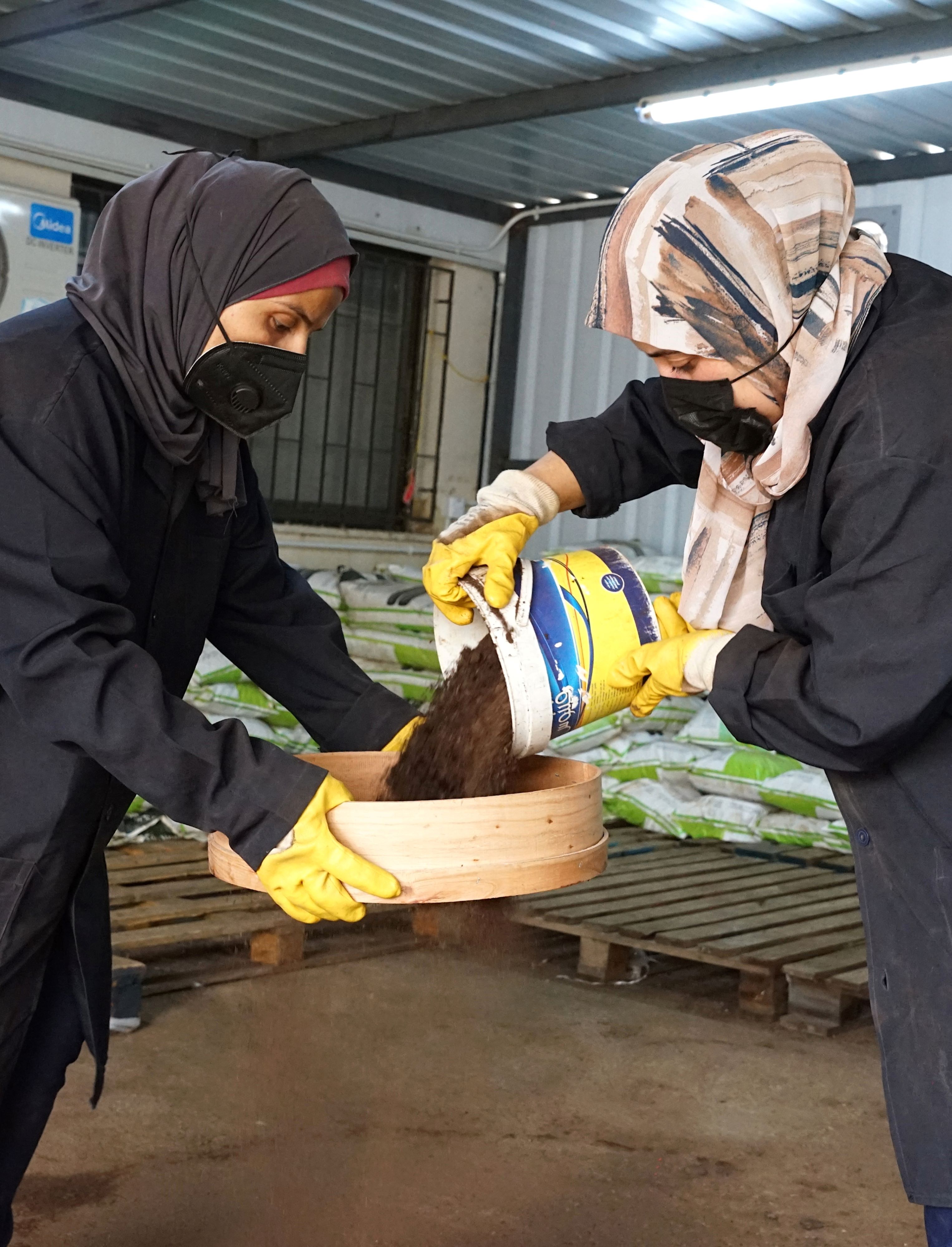Women's Economic Programme

Overview
UNDP partners with people at all levels of society to help build nations that can withstand crisis, drive and sustain inclusive economic growth to improve the quality of life for everyone. On the ground, in 177 countries and territories, UNDP converts global perspective and local insight towards helping to empower lives and build resilient nations.
Inclusive economic growth continues to be an important thematic area for Jordan’s Country Programme that aims at addressing vulnerabilities at individual, community, local authority and national institutional levels by supporting initiatives that foster an inclusive enabling environment for livelihoods and job creation for all, especially among vulnerable Jordanian and Syrian refugees youth and women in crisis-affected areas.
The further evolving impact of COVID-19 crisis in Jordan has deepened a sense of urgency to tackle the root causes of socio-economic fragility by promoting resilience through systems strengthening, enabling self-reliance among refugees and vulnerable Jordanians and signifies the importance of ‘resilience’ as core to programming.
The programme seeks to provide resilience-based development solutions for local economic recovery, including green economy opportunities and enabling equitable access to financial service solutions to ensure no one is left behind. The core of its programme strategy embraces a mid- to long-term approach to self -reliance for all including refugees.
This assignment specifically related to the UNDP’s project “Enhancing Women Participation in the Solid Waste Management Sector in Jordan” which aims to improving the socio-economic empowerment, well-being and stability of rural women in Northern Jordan, especially in the Solid Waste Management (SWM) sector.
Women in rural Jordan face multiple challenges such as high unemployment rates and low labor force participation – factors attributed to underlying social norms, gendered roles, power relation, and the lack of income-generating opportunities that meet women’s skills and needs exacerbated by the economic and the social pressures stemming from hosting 659,673 Syrian refugees in country and economic stagnation due to regional instability, fiscal pressures and economic impact of COVID-19 pandemic lockdown measures.
“Enhancing Women Participation in the Solid Waste Management Sector in Jordan” project will tackle economic gender gaps and address inequalities in decision-making at the household level as well as the local governance policy level. The project targets women in four municipalities in Irbid Governorate: three municipalities of Northern Shouneh district (Moa’th Bin Jabal, Tabqet Fahel & Sharhabeel Bin Hassnah) and Dair Abi Said municipality of Kourah district. The number of households in the Northern Shouneh is 24,659, with an average family size of 5.8 person, which is higher in comparison to the national family size average of 5.5. Social indicators show that female-headed households constitutes 12.2% of the total number of households in Northern Shouneh.
In Jordan, women’s economic participation and political empowerment remain a challenge. As evident in demographic trends throughout Jordan, women are lagging behind men in terms of formal economic participation due to well identified obstacles that includes social norms, legal framework, care responsibilities and transport. The gender gap is reportedly wider for Jordan’s most vulnerable women. For those with only a primary education, the statistic can be up to six men working for every one employed woman, at the same level of capacity. In 2020, the Global Gender Gap Index Report of the World Economic Forum (WEF) placed Jordan at 138th out of 153 countries. In Irbid governorate in particular, (geographic target of this project), unemployment rate in 2019 was recorder as 18.4% in general; with women’s unemployment rate reaching 24.4% compared to 16.7% among men. As for women’s economic participation in Irbid Governorate, the proportion was 15.6% which is near the national rate that ranged between 14% and 16% over the past years.
Globally, the average rate for women’s total entrepreneurial activity (TEA) is 10.2%. In Jordan specifically, women’s entrepreneurship represented a small share of total early-stage entrepreneurial activities of only (3.3%). The low rate of women’s TEA in Jordan needs to be addressed in relation to skills and self-efficacy of women intending to begin a new business.
The “Enhancing Women Participation in the Solid Waste Management Sector in Jordan” project will contribute to improving women’s quality of life in North of Jordan through enhancing their livelihoods, participation in public life, and their well-being. The entry point of this project is women economic empowerment and equality as means to addressing barriers that are hindering women from active participation in their communities as workers, entrepreneurs and change makers, with an understanding that real women’s economic empowerment exists when women and girls are given similar opportunities to men and boys in terms of knowledge, economic opportunities, gender-sensitive policies, decision-making power, as well as access to and control over assets and resources.
The design of the project is built around three tracks:
- Enhancing and strengthening the role of CSOs to enable such organizations to work effectively and efficiently with women within the targeted communities to become a vehicle for women and women’s voices in decision-making processes.
- Provision of financial support to the CSOs and Cooperatives to start working on increasing participation of women in the local economy, particularly in the solid waste sector, through designing and managing business groups’ projects.
- Working with national and local government to enhance gender informed and responsive policy making in SWM at local and national levels.
The Project aims at providing entrepreneurial opportunities for 600 women through 12 business groups projects in the SWM sector, and to further capacitate the 60 women from an already existing project of community-based sorting/recycling facility at Northern Shouneh (Ruwad Al Aghwar Al Shamalyeh Cooperative).

 Locations
Locations